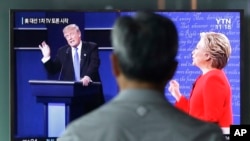Presidential candidates Hillary Clinton and Donald Trump set out sharply different ideas about America’s allies in Asia during their debate Monday night.
Clinton, a former United States Senator and Secretary of State, is the candidate of the Democratic Party. Trump, a businessman, is the Republican Party’s choice for president.
In the debate, Clinton noted existing U.S. agreements to defend the Asian allies with conventional or nuclear weapons, if necessary. She sharply criticized Trump’s earlier statements that suggested he might withdraw troops from Asia if elected.
“He has said repeatedly that he didn’t care if other nations got nuclear weapons … Japan, South Korea, even Saudi Arabia.”
Trump reacted to her comment by saying that Clinton was misrepresenting his position. He repeated his call for the allies to pay a greater share of security costs.
“All I said was they may have to defend themselves or they have to help us out.”
Trump also said that he wanted to negotiate a better deal to get more support for defense efforts aiding both sides. One reason is the U.S. government’s budget deficit.
“We are a country that owes 20 trillion dollars, they have to help us out.”
The two candidates did appear to agree on one thing. Both said that nuclear weapons were the biggest problem facing the world today.
The Republican nominee said the possibility that terrorists might gain a nuclear device is “the single greatest threat facing the United States.”
Clinton criticized the way Trump had spoken about nuclear weapons and the possibility that nations in Asia could acquire them.
“His cavalier attitude about nuclear weapons is so deeply troubling. That is the number one threat we face in the world and it becomes particularly threatening if terrorists ever get their hands on any nuclear material.”
U.S. nuclear policy has long been to prevent the spread of nuclear weapons. Central to this effort is the Treaty on the Non-Proliferation of Nuclear Weapons, which first became effective in 1970.
Trump calls for greater defense cost-sharing
In the past, Trump has called Japan and South Korea “free riders.” The United States has 50,000 troops in Japan and about 28,000 troops in South Korea.
The U.S. forces are stationed there to help support peace and security in East Asia. However, Trump has said that these countries and others contribute too little to support the American troops.
Trump has argued that, because the U.S. has large budget deficits, it no longer has enough money to keep large numbers of troops in bases overseas.
It is estimated that Japan pays $1.6 billion toward the costs of U.S. troops there and South Korea pays $866 million.
On Tuesday, South Korean Foreign Ministry spokesman Cho June-hyuck said his country is closely watching the U.S. election. Officials there are considering how the vote might affect relations with the U.S. and the alliance with it.
Cho said, “I can tell you that our government has been contributing and playing a role to maintain and strengthen Korea-U.S. joint defense capability and provide stable conditions for the USFK (U.S. Forces Korea) to be stationed.”
On Monday, the United States and South Korea carried out joint naval exercises, one of several major exercises this year.
The commander of U.S. Naval Forces Korea, Brad Cooper, said the exercise was organized to show “the unwavering strength and resolve” of America and its military allies.
Some U.S. lawmakers have moved to restate the country’s longstanding guarantee of protection to its allies.
In July, two members of the U.S. Senate wrote a commentary together. In it, Republican John McCain and Democrat Robert Menendez said the U.S. will meet its mutual defense treaty obligations no matter who is the next president.
However, some lawmakers in South Korea’s ruling Saenuri Party have expressed concern over the U.S. defense alliance. They are urging the South Korean government to develop its own nuclear weapons to defend against the growing North Korean threat.
I’m Mario Ritter.
Brian Padden reported this story for VOANews.com. Mario Ritter adapted it for Learning English. George Grow was the editor.
_____________________________________________________________
Words in This Story
acquire – v. to get, to come to own something
cavalier – adj. without concern for something important or serious
station – v. to put in place, to assign a person or group to an area for a period of time
contribute – v. to give
unwavering – adj. to continue without decreasing
obligation – n. something that must be done
mutual – adj. shared by two or more people or groups
conventional – adj. common or not unusual; traditional






